
Top story
The strong rebound in food to go boosted annual revenues and profits at Greencore, though the group warned of “further substantial inflation” in the coming year and the potential impact of cost-of-living factors on consumer spending.
Total reported group revenues for the year to 30 September increased by 31.3% to £1.74bn, driven by a increased volumes and a double digit percentage increase in underlying pricing.
Greencore said it benefitted from a “resilient” UK trading environment during the year, despite some demand volatility caused by Covid restrictions early in the year.
It said it benefitted from its strong market position in the grocery retail channel, its expanded customer and format mix, and its portfolio across food to go and other convenience categories.
New business wins onboarded in the year also contributed meaningfully to group revenue performance, with it working closely with one of its key food to go customers to extend its offering into the store network of a leading UK coffee shop retailer and the winning of a significant ready meals contract.
Pro forma sales in food to go categories increased by 35.2% year on year, driven by a combination of strong underlying volume growth, contribution from new wins, and increased pricing as we continued to recover inflation
While pro forma revenues in other convenience categories increased by 19.2%, driven by increased underlying pricing and higher revenue in the group’s Irish ingredients trading business.
Adjusted Operating Profit rose from £39.0m to £72.2m with adjusted operating margin up by 130bps to 4.2%.
Overall group profit before tax was £39.8m in the year, up from £27.8m.
So far in its 2023 financial year it said revenue performance in the early weeks has “broadly held up” however, there has been mix effect between categories.
“We remain cautious about the potential impact of the recessionary environment and cost-of-living factors on consumer spending through the year ahead, the impact of which has not yet been fully absorbed by the consumer,” it stated.
The group said it expects the current year to see further substantial inflation and it continues to work on recovery and mitigation.
CEO Dalton Philips commented: “Greencore has made great progress in recovering from a very challenging period with revenue, profits, leverage and returns all improving significantly in FY22. I want to acknowledge and thank our teams and colleagues who have done and continue to do a fantastic job every day in driving the business forward.
“My first few weeks in the CEO role have confirmed to me the fantastic capability and potential of this business. Our leading market positions, close customer relationships, well invested facilities and intense focus on efficiencies give us confidence as we continue to navigate our way through the challenges of the current macroeconomic climate.”
Greencore shares are down 2.3% this morning to 69.5p.
Morning update
At an investor seminar today in Barcelona, Nestlé has said it will share its strategy for sustainable value creation and outline its 2025 targets.
Nestlé expects to return to an underlying trading operating profit margin range of 17.5% to 18.5% by 2025, following the margin impact of a sharp increase in cost inflation in 2021 and 2022.
The company also expects to deliver an annual underlying EPS growth range of 6% to 10% in constant currency over the period 2022 to 2025.
Nestlé will describe its plans to boost growth through brand building, innovation and digitalisation, while supporting margin development through efficiency programs.
Mark Schneider, Nestlé CEO: “We have made significant progress in recent years, accelerating organic growth, increasing margins and enhancing capital efficiency. Today, we outline our value creation model and targets for 2025 as we aim to deliver consistently in turbulent times.
“We will continue to invest for future growth, investing behind our brands, delivering impactful innovation, leveraging digitalization and improving speed and agility. Creating shared value for stakeholders remains our focus, with Good for You, Good for the Planet at the heart of our strategy.”
Nestlé said it will continue to pursue external growth opportunities in fast growing segments and regions. The company remains disciplined in its approach to portfolio management, looking for strategic and cultural fit, as well as attractive financial returns.
Meanwhile, Nestlé has decided to explore strategic options for Palforzia, the peanut allergy treatment, following slower than expected adoption by patients and healthcare professionals. The review is expected to be completed in the first half of 2023. Going forward, Nestlé Health Science will sharpen its focus on Consumer Care and Medical Nutrition.
Nestlé also confirms its ongoing program to repurchase CHF20bn of its shares over the period 2022 to 2024. The company has already bought around CHF9.7bn of shares in 2022.
Elsewhere, ingredients specialist Treatt has reported a “difficult” set of financial results for the year to 30 September.
Revenues were still up 12.8% to £140.2m (9.1% in constant currency) with growth across all categories except tea, however gross margins declined to 27.9% mainly due to lower hard tea sales and FX losses.
As a result, profit before tax and exceptional items reduced by 27.1% to £15.3m.
Revenue growth was broad-based, across all of categories, with the exception of tea where sales declined on the back of an exceptional 2021 performance and lower than expected demand in hard tea (ready-to-drink canned cocktail market) in the US, which also materially impacted margins for the year.
Citrus, which contributed 47.6% of group revenue, grew by 23.2%, while margins remained broadly in line.
Whilst approximately 80% of the group’s revenue now comes from natural and clean-label product ranges, its synthetic aroma sales increased by 13.6% with growth in products used to flavour alternative proteins and savoury snack foods.
The group said it has instigated a correction of previously over-hedged FX contracts during the financial year and the implementation of new FX management systems which will provide greater controls for the group in this area.
The year saw continued investment of £12.8m in capital projects, including £5m on a new UK facility with the majority of production now transitioned and operational from the new site.
Looking ahead, Treatt said it remains encouraged by growth opportunities from new and existing customers, particularly in the US and China, and its ongoing progress in coffee.
The key challenges for the year will be macroeconomic driven, it said, with pressure from multiple angles.
“However, as demonstrated most recently during the pandemic, beverages are seen as affordable luxuries and provide great resilience in difficult economic times, and the market trends towards healthier, natural products continue to support our strategy,” it stated.
CEO Daemmon Reeve commented: “It’s been a mixed year for the business, with a very encouraging sales performance across all product categories, except hard tea, and significant progress building our infrastructure for future growth. We announced some short-term profitability headwinds in August, particularly in hard tea, but have finished the year in line with revised guidance. We have learnt from the disappointments and my belief in our growth potential and determination to succeed is undimmed, driven by the teamwork and commitment to our customers that lies at the heart of Treatt’s culture.
“We remain as excited as ever about the pipeline of opportunities for Treatt, with the business now well-invested to fulfil our medium term ambitions. Coffee is an emerging category in its own right, for which we now have a dedicated team in place and high hopes for growth.
“In the face of macro challenges, there is a wave of positive change across the business. On the back of a resilient market in natural and healthy products, which plays to our expertise, we are looking forward to the future with optimism.”
Batteries, lighting and vaping supplier Supreme has posted a modest rise in sales in the first half of its financial year, driven by strong growth in vaping.
Revenue for the period was £64.6m, up 6% year-on-year. The increase was driven by a £10.1m, or 47%, increase from vaping, £3.4m of which arose from the businesses acquired in the Period, with the remaining £6.7m coming from organic growth in the form of new product launches and increased distribution.
However, this growth was offset by a £7m, or 53%, reduction in lighting revenues, driven by a slowdown in consumer spending and retailer overstocking in 2022.
Revenue also grew for Sports Nutrition & Wellness by 19% and Batteries increased 5%, whilst Branded Household Consumer Goods revenues fell, as expected, despite the division still generating the same amount of cash gross profit.
Adjusted EBITDA fell from £10.1m to £8.1m, with profit before tax down 48% to £4.4m.
However, it said that despite this “modest” start to the year, sales momentum continues to build, and it now expects to be ahead of market expectations for 2023.
The vaping category expected to deliver a robust performance in the second half, reflecting positive impact of both organic and acquisitive growth. While the business continues to navigate global trading challenges arising from raw material cost price increases, and inflationary increases to its overhead base.
CEO Sandy Chadha commented: “Pleasingly, the business has delivered a solid trading performance in the period, buoyed by excellent sales growth from within our Vaping category. The additional expansion of our Vaping and Sports Nutrition & Wellness product portfolios, combined with our enhanced retail and online footprint and the rationalisation of our manufacturing operations, continues to support our value consumer proposition.
“With our Lighting division stabilising after a temporary setback, and pricing pressures beginning to ease, the Board’s confidence in the group’s future growth prospects remains high, and we look forward to a productive second half of the financial year.”
Finally, Tesco has announced a continuation of its share buyback programme.
It has entered into an arrangement with Citi to repurchase shares on behalf of the company, as part of its existing commitment to buy back a total of £750m worth of shares by April 2023.
On the markets this morning, the FTSE 100 is up 0.6% to 7,520.9pts.
Risers include Just Eat Takeaway.com, up 2.7% to 1,910.2p, Marks & Spencer, up 1.4% to 125.7p and Compass Group, up 0.9% to 1,863.5p.
Fallers include Bakkavor, down 4.2% to 91p, Kerry Grop, down 1.8% to €91.56 and Naked Wines, down 1.3% to 92.8p.
Yesterday in the City
The FTSE 100 started the week edging down 0.2% to 7,474pts.
Fallers included THG, down 3.6% to 66.7p, Kerry Group, down 2.9% to €93.20, Deliveroo, down 2.6% to 88.2p, Ocado, down 2.5% to 633.8p, Pets at Home, down 2.3% to 270p and Naked Wines, down 1.6% to 94p.
Risers included Bakkavor, up 6.2% to 95p, Hilton Food Group, up 1.7% to 544p, Just Eat Takeaway.com, up 1.6% to 1,860.8p, Reckitt Benckiser, up 1.2% to 5,968p, Unilever, up 1% to 4,155p, and McBride, up 0.7% to 21.2p.







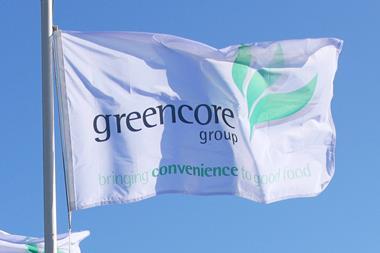
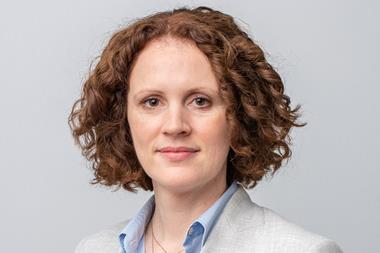
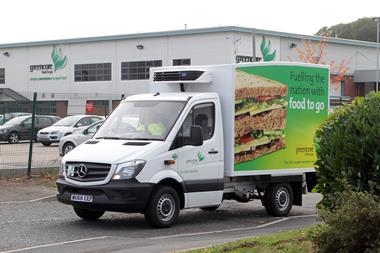
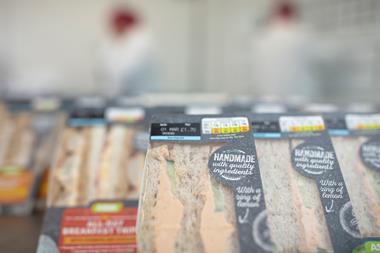
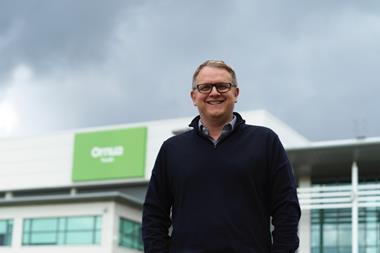
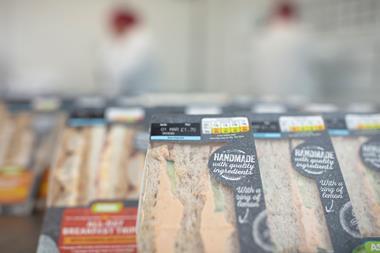






No comments yet